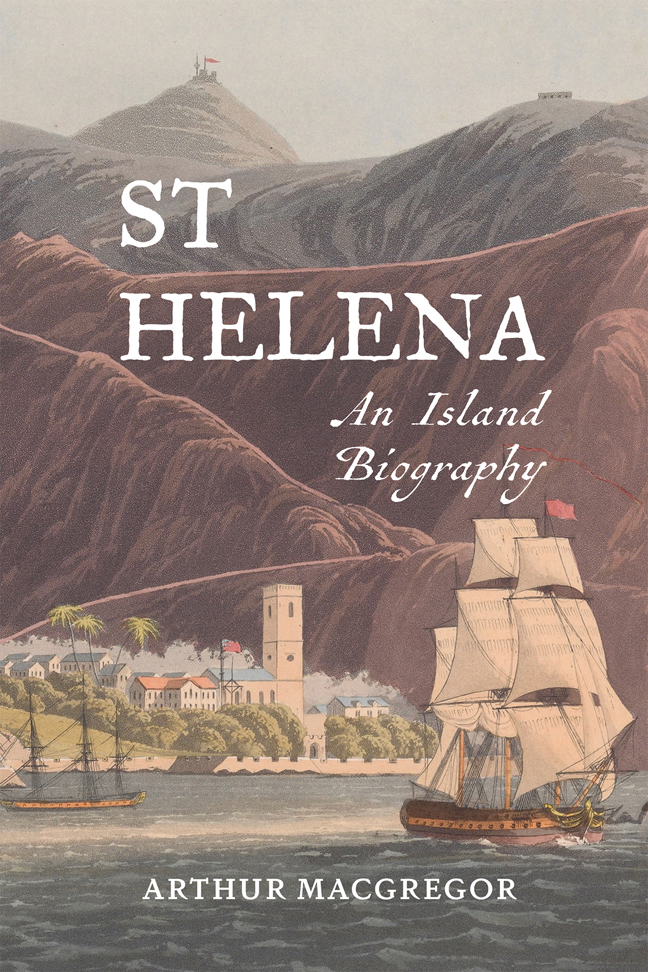Book contents
- Frontmatter
- Contents
- List of Illustrations
- Photo credits
- Preface
- Acknowledgements
- 1 Genesis
- 2 The breach: Europe and St Helena collide
- 3 Population and environment: early impacts
- 4 Population and environment: asserting control
- 5 ‘The citadel of the South Atlantic’
- 6 Scientists in transit: St Helena as a site for scientific investigation
- 7 Napoleon on St Helena
- 8 Later detainees, 1800s and 1900s
- 9 A place in the modern world
- Appendix: Governors of St Helena
- Bibliography
- Index
6 - Scientists in transit: St Helena as a site for scientific investigation
Published online by Cambridge University Press: 21 February 2024
- Frontmatter
- Contents
- List of Illustrations
- Photo credits
- Preface
- Acknowledgements
- 1 Genesis
- 2 The breach: Europe and St Helena collide
- 3 Population and environment: early impacts
- 4 Population and environment: asserting control
- 5 ‘The citadel of the South Atlantic’
- 6 Scientists in transit: St Helena as a site for scientific investigation
- 7 Napoleon on St Helena
- 8 Later detainees, 1800s and 1900s
- 9 A place in the modern world
- Appendix: Governors of St Helena
- Bibliography
- Index
Summary
For over three centuries, while the attention of the government and population of the island was focused on matters of survival and improvement, St Helena played host to a succession of scientists pursuing research in a variety of fields, attracted by the island's isolated geographical location in the South Atlantic, the geological history locked in its rocks, the indigenous flora and insect fauna with which it was blessed (and subsequently robbed), or the denizens of its surrounding seas. Few places on the planet can have proved so popular a laboratory for the compiling and testing of scientific theories and for field surveys – a practice that survives today; recent years have seen the island used as a base for exercises as diverse as satellite tracking and deep-sea oceanography.
A constellation of astronomers
During the development of (on the one hand) modern astronomical practice in Britain from the seventeenth to the nineteenth century and (on the other) the extension of the British Empire into the southern hemisphere and the Far East, St Helena proved repeatedly inviting to aspirant astronomical observers. Despite its strategic location on the surface of the globe, however, the island's topography and the vagaries of its weather conspired on more than one occasion to frustrate the ambitions of would-be observers, however carefully-planned their expeditions.
Edmond Halley
Edmond Halley (1656–1742) arrived on the island in 1676, having just turned twenty-one but already with a respectable reputation as an astronomer. He had begun making observations while still at school and continued to do so at Oxford, publishing his results in the Philosophical Transactions of the Royal Society. It is from his correspondence with Henry Oldenburg, the society's secretary, that we first learn of Halley's ambitions to observe the southern stars and of his nervousness that a rival astronomer then preparing a book in Paris might pre-empt his aim to be the first observer in this field:
… if that work be yet undone, I have some thoughts to undertake it my self, and go to St Helena … by the next East Indie fleet, and to carry with me, large and accurate Instruments, sufficient to make a good cataloge of those starrs, and to compleat the Celestiall globe … I will willingly adventure myself, upon this enterprize, if I find the proposition acceptable,
- Type
- Chapter
- Information
- St HelenaAn Island Biography, pp. 107 - 149Publisher: Boydell & BrewerPrint publication year: 2024

